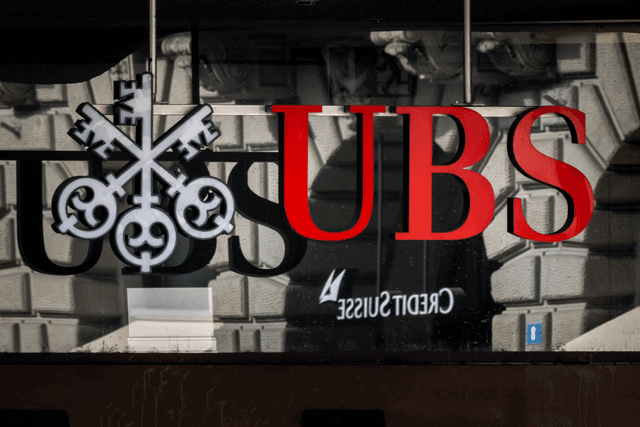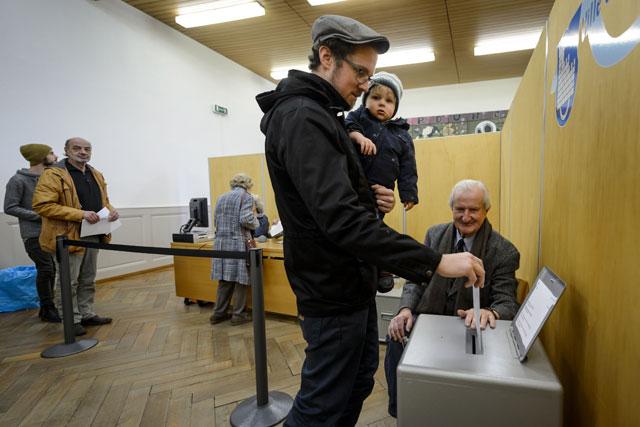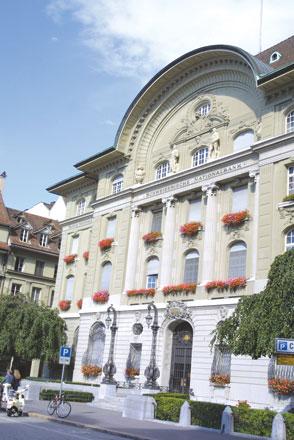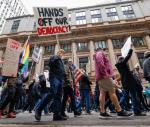You are here
Switzerland votes on whether to stop banks’ money making machine
By Reuters - Jun 08,2018 - Last updated at Jun 08,2018

Swiss 1,000-franc notes are seen in this picture illustration taken on February 16, 2016 (Reuters file photo)
ZURICH — Supporters of a radical scheme to upend Switzerland’s financial system have made an 11th hour appeal to voters to approve a proposal to strip banks of the power to create new money through lending.
Postal voting, which accounts for the majority of participation in Swiss referenda, is under way in the so-called Sovereign Money initiative, with the polls closing on Sunday.
Contrary to common belief, most money in the world is not produced by central banks, but is instead created by commercial lenders when they lend beyond the deposits they hold for savers.
This arrangement, underpinned by the belief that most debts will be repaid, has been a cornerstone of the global capitalist system, but opponents say it is unstable because the new money created exceeds economic growth.
Swiss campaigners want to replace this approach, where banks regularly roll over their financing of loans, with a system of “Vollgeld” — which can be translated to “real money”.
“A large majority of people in Switzerland don’t want commercial banks to produce money out of nothing and believe only the SNB should have the right to create money in Switzerland — this is their chance to make this happen,” said Raffael Wuethrich, one of the campaign’s leaders said.
The Sovereign Money initiative would allow banks only to give credit to customers using funds they have from long term customer deposits, the Swiss National Bank (SNB) or money markets.
“Our opponents have tried to make people afraid and insecure about our plans, but when people find these fears are unfounded they are coming over to our side,” said Wuethrich.
If the Swiss vote “yes”, the law introducing “real money” would be written into the country’s constitution. It would then fall to the government to work out how to introduce it within three years. The referendum is in part the result of growing frustration in traditionally banker-friendly Switzerland with the financial sector, after the government bailed out the country’s biggest lender UBS in 2008.
This, along with rock bottom interest rates for savers and sky-high pay packets for finance executives, has opened the way for a vote which could turn back the clock 100 years to when the SNB created most of the money used in the country.
“The banks have too much influence in Switzerland,” said Julian Baecker, a post-graduate student. “They have a lot of power without responsibilities. For example, the taxpayer had to pay for their mistakes during the financial crisis.
“I think the Swiss people are more critical about banks than they used to be and something needs to change.”
One sovereign money supporter questioned why banks have the right to create money. “This kind of privilege often promotes riskier business models,” said Marti Alder.
If voters back the campaign, Switzerland would become the world’s first country to adopt a sovereign money system, where the SNB will be the only authority allowed to create money in the country and banks will be barred from creating money when they make loans.
One early poll had shown 44 per cent of voters backing the initiative but support has slipped to 34 per cent ahead of the vote.
Sovereign money is full-value legal tender which is created and brought into circulation by public institutions, typically a central bank, rather than commercial banks.
Currently, coins and banknotes are the only forms of sovereign money available to the public, although the term also applies to deposits held on site by the commercial banks with the central bank.
Only around ten per cent of the Swiss money supply is created by the SNB at present, compared with 90 per cent created electronically by the commercial banks, the campaigners say.
Their proposal aims to guard against bank runs by giving customers access to “full money” accounts — which will be off the commercial banks’ balance sheets and backed with central bank money.
Opponents have said the plan could lead to higher bank charges, strangle access to credit and weigh on Switzerland’s economic growth.
The initiative has been opposed by the Swiss government and the SNB, which has described the plan as an “unnecessary and dangerous experiment”.
The fact that a referendum is taking place has unnerved some investors.
“It will be a catastrophe on every level,” said Marie Owens Thomsen, global head of economic research at Indosuez Wealth Management, commenting on the possibility of a “yes” vote.
But campaigners remain undeterred.
“Of course the banks and financial institutions are against changing the system because they benefit overwhelmingly from it at present,” the campaign’s Wuethrich told Reuters.
“We hope that people can see through the scaremongering and decide to have real money in their accounts instead of a token from the banks,” he said.
Investors have been buying up insurance against swings in the Swiss franc and the shares of the biggest Swiss lenders to hedge against turbulence if the vote is approved.
“Switzerland would be hit by a monetary revolution. We talk about banks, but the real concern is the whole economy,” the Swiss Bankers Association Chief Economist Martin Hess said.
Ratings agency S&P Global said a win for sovereign money scheme could result in uncertainty among banks and investors.
“If we see increasing funding risk or investors questioning banks’ ability to adapt to a potential new regime, a transition to a sovereign money system could have an immediate effect on outstanding Swiss bank ratings,” it said in a report published this week.
“In the long term, the introduction of a sovereign money system could weaken Swiss banks’ profitability and raise questions about their future business model.”
Related Articles
ZURICH — UBS was up against the clock Sunday in talks to finalise a mammoth takeover of its troubled rival Swiss bank Credit Suisse and reas
Swiss voters overwhelmingly rejected proposals on Sunday to boost gold reserves and impose strict new curbs on immigration, averting a potential nightmare for policy makers struggling with a popular backlash against the country’s open borders.
AMMAN — Deposits of Jordanians in Swiss banks were around JD2.13 billion (around $3 billion) last year, according to a recent report release
















